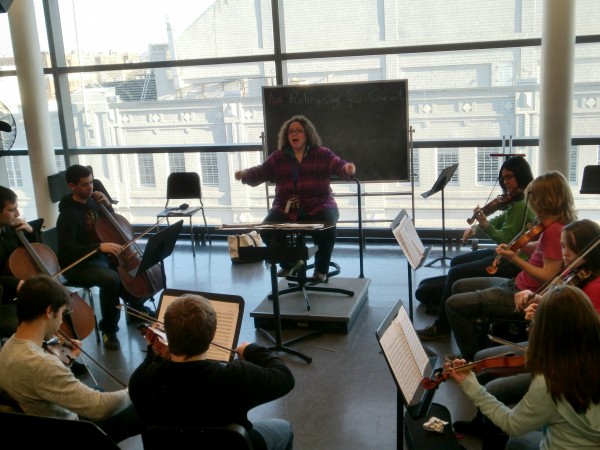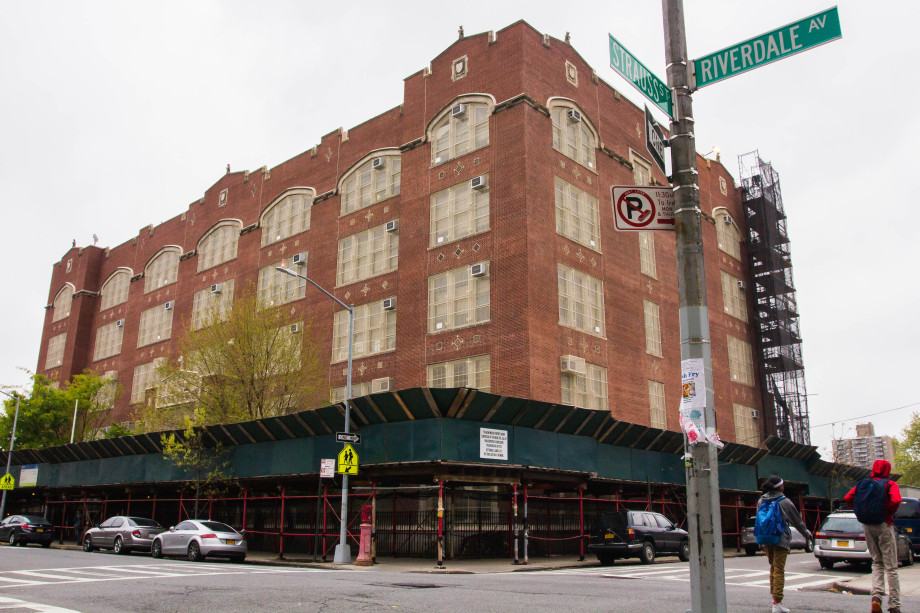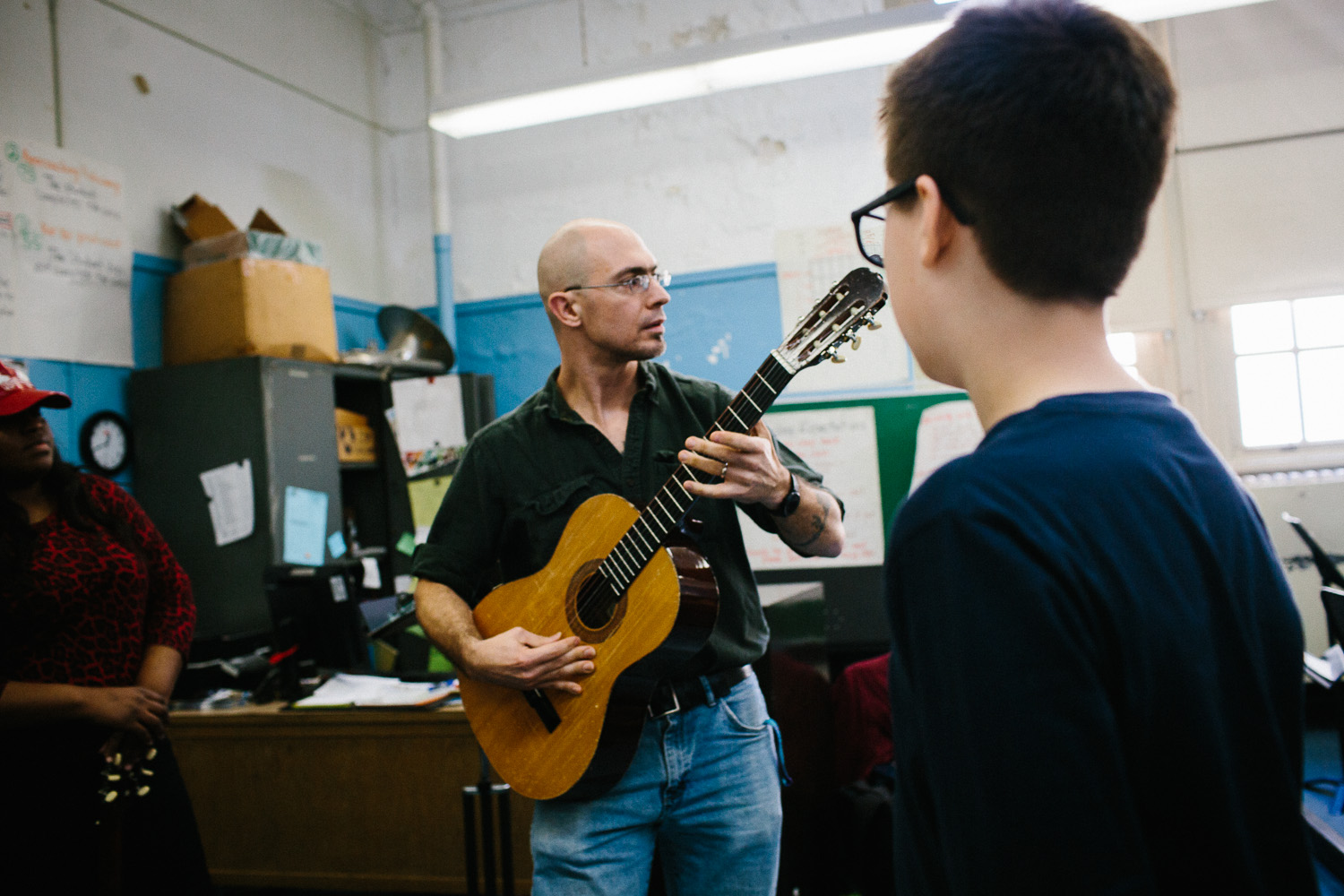
Laura Epstein stood slightly bemused in front of a group of ninth grade musicians at Frank Sinatra School of the Arts in Astoria, Queens, one Monday afternoon in February. The students had just finished playing what was marginally recognizable as the theme song from Pirates of Caribbean. Instead of losing her cool, the trained classical musician with hundreds, if not thousands, of performances in her resume, raised her hand to get the teenagers’ attention.
“This piece is like an onion,” she stated matter-of-factly. Students exchanged confused glances. It may seem hard now, Epstein explained to the 20 young musicians, but the more they played it, the more layers would peel away, and the piece would improve.
The three girls who had stopped playing viola halfway through did not seem convinced. A jokester on the double bass blurted out that he didn’t smell the strong onion odor. Epstein didn’t miss a beat: “Well, the way you just played this kind of stinks.”
Epstein is not a typical high school music teacher, nor is she a typical classical string player. She does not possess the ethereal, girlish appeal of famous cellist Jacqueline du Pre. She looks nothing like the pop star violinist Vanessa Mae, who plays violin in a wet-looking, swimsuit-like dress. Dressed in a brown pantsuit and comfortable sneakers that had seen better days, the unassuming virtuoso with glasses and ruffled curls is all business, spiced up with a big dose of creative fun. Her goal is to help her charges become the best musicians they could be, and, more importantly, to have fun in the process.
Case in point: The onion speech worked. By the end of the class, the Pirates theme song sounded like the Pirates theme song.
This beginners’ string class was just one of many arts courses offered at Frank Sinatra, an audition-based performing arts high school where more than 700 students study dance, drama, vocal music, film and media, fine arts, and instrumental music, in addition to their regular academic coursework. The student body is almost 70 percent female.
Frank Sinatra has been widely considered a success since its founding by singer Tony Bennett in 2001. Almost 97 percent of its freshmen earn the expected 10 credits or more in their first year of high school, and the average college-bound senior has a combined SAT score of 1500. While the school environment was not rated as favorably by participants in the Department of Education’s Progress Report survey, the school has other strong points.
One of them is its connection with arts organizations in New York City. Frank Sinatra offers students internships with its many partners, like the New York City Ballet and the Queens Symphonic Orchestra.
Epstein’s inventive methods have influenced musicians beyond the classrooms of Frank Sinatra. One afternoon in 2005, Epstein received a call from Warner Bros., asking if she would train an actor for a movie. The actress was Keri Russell, 29 at the time, and Epstein was given four months to turn her into a believable cello player for the movie August Rush.
Russell couldn’t even read notes when they began, so Epstein color-coded the sheet music, and created a slowed-down version of the movie recording for Russell to use. In the end, Epstein recalled that Keri Russell played an accomplished cellist so convincingly that the hand double who was hired for close-up shots spent her time on set mostly asleep on a couch.
The first call from Hollywood led to another. After the release of August Rush, Fox Searchlight productions wanted Epstein for The Secret Life of Bees. She was hired to teach Alicia Keys how to play a cello in New York City, before the production moved South. Epstein still vividly remembered her first encounter with Keys in 2007 at the singer’s mother’s house. “I hear these clunky footsteps, and then in comes one of the most glamorous people I have ever seen.”
The love for music that she had shared with so many other people was in Epstein’s blood from the very beginning. She grew up in Flatbush, Brooklyn, with parents who both worked as violin teachers. In fact, her mother first met her father when she was taking violin classes from him.
“I always say, she never missed a lesson,” Epstein said with a chuckle.
She began playing the violin herself when she was 3 years old, but at age 11 decided that the cello was her instrument. “Something about the cello just pulled me in,” Epstein said. “Maybe it’s just how you’re sitting there, hugging something.”
After graduating from the Manhattan School of Music, Epstein toured the country with a production of the Broadway musical, Jesus Christ Superstar for seven months in the 1980s. She began giving music lessons, first privately, and then from 1990 to 2007 with the School for Strings in Manhattan, where she taught under-5-year-olds according to the Suzuki method. This approach is about teaching music in a natural way — the same way children might learn to speak. Epstein picked up the non-authoritarian, creative teaching style right away.
“She has a very easy-going attitude, which is unusual for music teachers. Usually, they’re pretty tense,” Alexander Yudkovsky, the director of the music school that was founded in 1970, said about his former colleague. “She is able to establish a great rapport with kids.”
The same was true for older children. During her 10 years at the Frank Sinatra High School of the Arts, Epstein had become an inspiration to a number of her students.
One of them was Miles Norman, a senior, who had never touched a cello before he auditioned on a guitar for a spot in the Frank Sinatra school. At a concert this March, the cellist was one of the three soloists. Epstein glowed when she talked about him.
Norman smiled fondly, and called her playing style “warped.” He said at first he was scared of Epstein’s direct manner, but then he realized she was just a down-to-earth woman instead of a lofty musician: “Don’t judge a book by its cover.”
Norman wasn’t the only one to whom Epstein opened the world of the cello. For one little girl, she completely re-strung the instrument. Brett Ellison was born without her left arm 27 years ago. When she was four years old, her mother, Debbra Ellison, read a magazine story about a one-armed boy who played the violin. An idea was born. Because Brett could only use her prosthesis to hold the bow, the action usually reserved for the right hand, Epstein constructed a “left-y cello” for the little girl.
“Laura liked the challenge, she really did,” Debbra Ellison said about her daughter’s former music teacher. “She’s magical.”
When Brett once accidentally left her prosthesis in a cab (she only used it for playing music), and the family took off on an out-of-town weekend trip, it was Epstein who first called 311. The case of the little cello player who lost her arm made it into all major news publications and the Ellisons got a tour of City Hall by then-mayor Rudolph Giuliani. Eventually philanthropist Percy Ross donated a new prosthesis.
Epstein thoroughly enjoyed giving Brett the opportunity to play the cello, and said she didn’t mind the extra effort in the least.
“It was a labor of love,” Epstein said. With a chuckle, she added, ”Necessity is the mother of invention!”




Thank the Lord there are people like Laura Epstein
devoted to the art of teaching the gift of music.